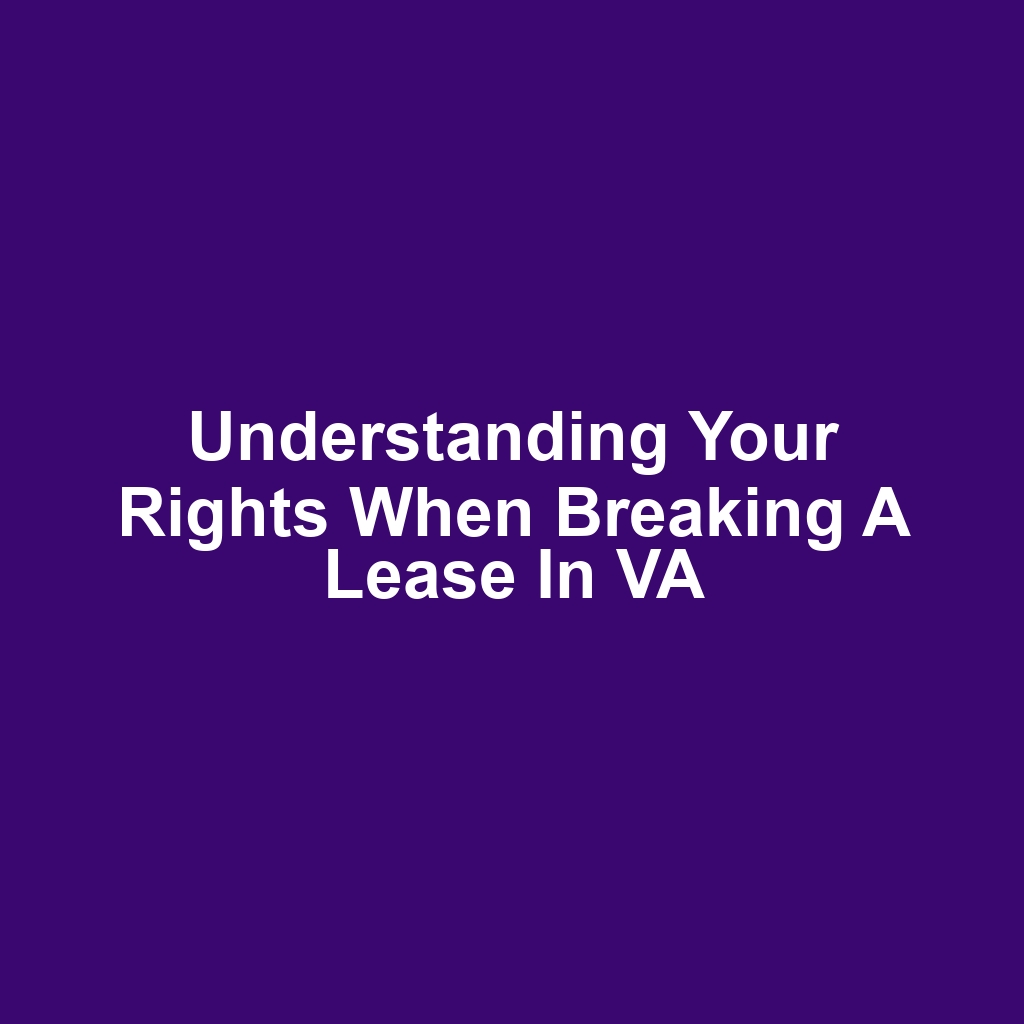When tenants find themselves in a situation where they need to break a lease in VA, they often feel uncertain about their rights and responsibilities. Many aren’t aware of the legal grounds that can justify breaking a lease or the protections afforded to them under state law. It’s crucial for them to understand the proper procedures for notifying their landlord to avoid potential disputes. Additionally, they should be aware of the consequences that may arise from breaking a lease and how to mitigate any damages. This article aims to provide essential insights into these important aspects, helping tenants navigate the complexities of lease agreements in Virginia.
Legal Grounds for Breaking a Lease in Virginia
Many tenants in Virginia may find legal grounds for breaking a lease due to factors like domestic violence or uninhabitable living conditions. For instance, if a tenant experiences domestic violence, Virginia law allows them to terminate their lease without penalty. They simply need to provide their landlord with appropriate documentation, such as a protective order. Similarly, if a rental unit is deemed uninhabitable, tenants have the right to break their lease. This could include issues like lack of heat, mold, or severe pest infestations. Landlords are obligated to address these conditions promptly. If they fail to do so, tenants can take legal action to protect their rights. Additionally, tenants may terminate their lease if they are called to active military duty. It’s crucial for tenants to understand these rights to navigate the process effectively.
Tenant Rights and Protections
Tenant rights and protections in Virginia ensure that individuals have legal recourse when facing unfair lease-breaking situations. They’re afforded protections under the Virginia Residential Landlord and Tenant Act, which outlines their rights. Tenants can’t be evicted without proper notice and due process. If a landlord fails to maintain habitable living conditions, tenants may have grounds to break their lease. Additionally, retaliatory actions by landlords are prohibited if tenants engage in legal rights. Tenants have the right to retrieve their security deposits within a specific timeframe. They’re also entitled to a written notice if a landlord intends to enter the rental property. If a tenant is facing eviction, they must be given an opportunity to contest it in court. Understanding these rights can empower tenants to take action against unjust lease-breaking repercussions.
Notifying Your Landlord Properly
Notifying the landlord properly is crucial, as failing to do so could lead to misunderstandings and potential financial penalties. Tenants should always check their lease agreements for specific notification requirements. It’s often necessary for them to provide written notice, detailing their intent to break the lease. Some landlords may require a certain notice period, typically 30 days, while others might have different stipulations. Clarity in communication helps prevent disputes and ensures both parties are on the same page. Tenants shouldn’t forget to keep a copy of the notification for their records. In some cases, sending the notice via certified mail can provide proof of delivery. Understanding the proper procedure can alleviate stress during the lease termination process. Ignoring these protocols could result in significant consequences and penalties.
Potential Consequences and Penalties
Breaking a lease in Virginia can lead to significant financial penalties and a negative impact on one’s rental history. Tenants might face losing their security deposit, which can be a considerable amount. They could also be responsible for paying rent until the property is re-rented, potentially for several months. Moreover, landlords may pursue legal action to recover unpaid rent, leading to court costs and additional fees. It’s not uncommon for late payments or lease violations to show up on a tenant’s credit report. This can hinder future rental opportunities, as many landlords check credit histories. Additionally, landlords may retain the right to report tenants to collection agencies for unpaid dues. A negative rental history can make it challenging to secure housing in the future. Overall, the consequences of breaking a lease can be severe and long-lasting.
Options for Mitigating Damages
When facing the repercussions of breaking a lease, individuals often explore various options for mitigating damages. They may seek solutions that can ease their financial burden and protect their rights. Understanding these strategies is crucial for navigating the complexities of lease agreements in Virginia.
Finding a New Tenant
Finding a new tenant can significantly reduce the financial strain caused by a lease termination. It’s often more feasible for landlords to fill vacancies quickly rather than pursue legal action. Many renters search for suitable candidates through social media or local classifieds. Offering incentives, like reduced rent for the first month, can attract potential tenants. In doing so, everyone involved may benefit from a smoother transition.
Negotiating Lease Terms
Negotiating lease terms can provide individuals with more favorable conditions that align with their needs and circumstances. It allows tenants to address specific concerns, such as duration, rent amount, and maintenance responsibilities. Many landlords may be open to adjustments if approached respectfully and with clear reasoning. Successful negotiations can lead to a more comfortable living situation and reduce potential conflicts. However, it’s essential to be aware of legal considerations and rights that govern these agreements.
Legal Considerations and Rights
Legal rights and considerations play a vital role in determining the outcomes for tenants facing lease termination. It’s important for tenants to know their rights regarding notice periods and lease terms. They should also be aware of the legal implications of breaking a lease, including potential penalties. Tenants can benefit from understanding Virginia’s laws on lease agreements and tenant protections. By being informed, they can make better decisions and mitigate potential damages.
If you’re looking for valuable resources to assist you in navigating complex situations, I highly recommend visiting this page on Tips for Using a Drowning Worksheet. It offers practical advice that can help you effectively manage various challenges. Check it out here: drowning worksheet.
